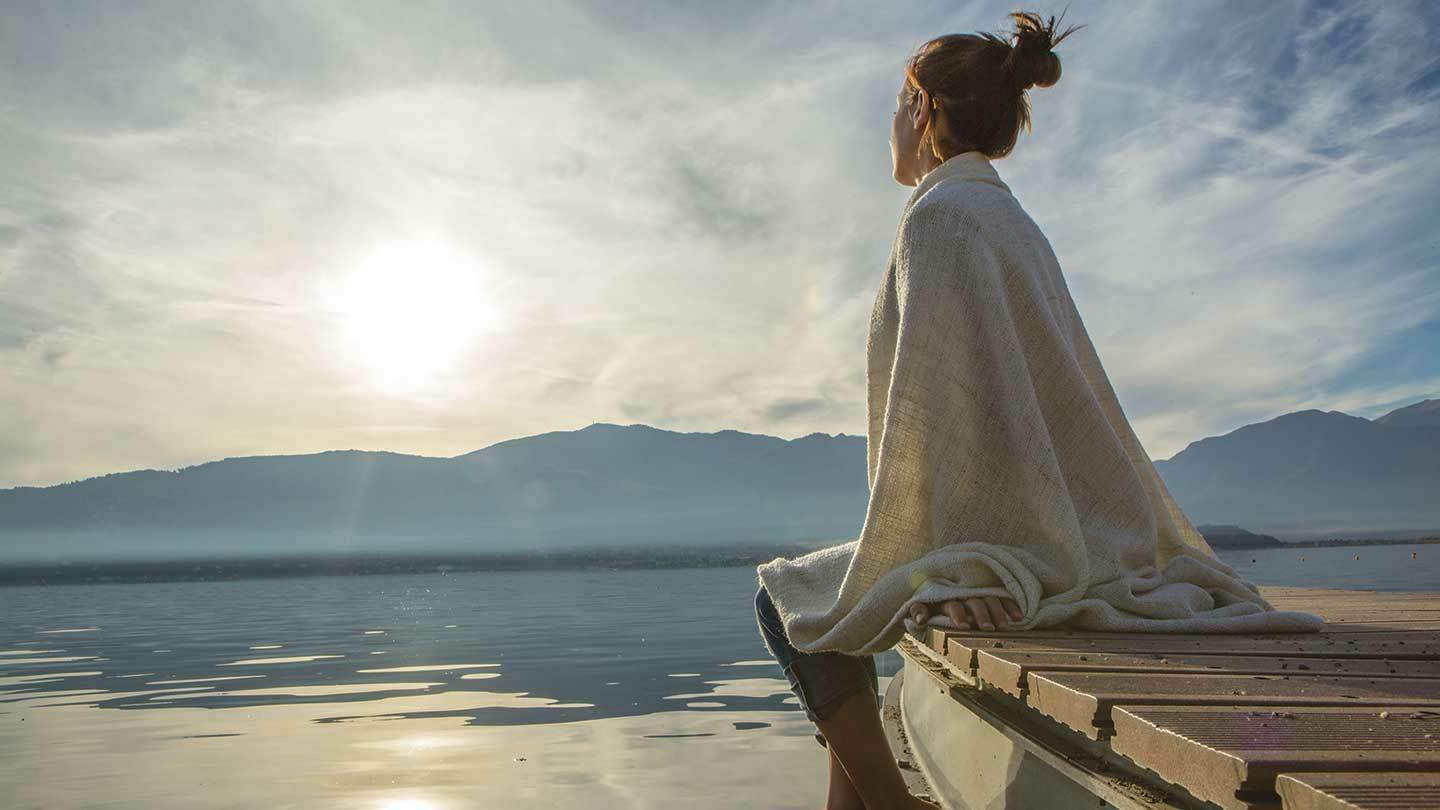Some people are put off by the word ‘retreat’, assuming it means a strict and rather joyless regime. However, today’s retreats are generally more pleasurable, less outlandishly expensive and more tailored to the consumer - you don’t have to do sunrise yoga every morning if you don’t want to: it’s your time.
Indeed, the modern retreat could cover anything from a weekend of not using your mobile phone (digital detox) to a few days of relaxation and healthy living in a bucolic countryside setting (wellness or mindfulness retreats).
You can also go on a retreat to kickstart a new fitness regime, relieve stress, practise meditation and spiritual exercises, enjoy outdoor activities or cookery classes, tap into your creativity, improve sleep or self-esteem, have life-coaching - and, yes, lose weight if you must, although this is more often a side-effect to healthier living.
Or you can go on a retreat to do nothing at all. The word retreat means ‘draw back’, escape from the stresses and strains of daily living for a period of time. In military language, it means to withdraw from battle: sometimes life can feel like that.
The best part is, nowadays, you don’t have to travel to remote corners of the globe to get the benefits of a retreat.

This varies. You can have a spa day retreat or half-day. All this means is that it will tailor treatments, food and maybe classes or consultations around the retreat theme, such as cooking, yoga or de-stressing.
A weekend retreat could be anything from one overnight getaway to two. It may include one or two classes a day, a talk, treatments, use of spa facilities, meals, and perhaps group activities. The schedule will be full – so you get your money’s worth – but with options to opt out if you wish to enjoy some free time. Don’t worry, you won’t have to hide in your room feigning illness to avoid Pilates.
If you are travelling abroad, you will usually want more than two nights on a retreat. A four-day retreat in Europe is quite common. A four-day retreat in the UK is usually aimed at a longer-term lifestyle change and properly allows you to escape daily life. It allows you to begin to see results and should set you up to continue your new regime at home.
Some retreat centres suggest you need at least a week or more if you want to see serious results, such as weight loss or improved health. If you are lucky enough to go on a retreat in Sri Lanka, you may want to spend two weeks there to make the most of it.
Retreats come in all shapes and sizes. You can book a spa retreat where you will stay in the spa hotel and have an itinerary and menu planned for you. Resort retreats function in a similar way. With both you may be mingling among ordinary hotel or spa guests, so if you are on a detox retreat, you may have a separate table and menu. Private retreats either have their own private land and buildings, or hire places specially designed to run retreats. These don’t always have spas, but often offer hot-tubs and treatments.
Within these formats, there are three broad categories of retreats: food, fitness and wellness.

Food is any retreat where the focus is on what you eat, although there may be some gentle activities, classes and treatments to compliment your diet. The food focus could be restrictive such as juice fasting for weight loss, cleansing or ‘detoxing’, or educational and health-focused, such as nutrition-led retreats.
If you are feeling sluggish and unwell, and have some health concerns, some retreats focus on gut health and healing through a medical-based diet. Many health diets will cut out meat, sugar, gluten and dairy to give your digestive system a rest. An Ayurvedic retreat will prescribe an Ayurvedic diet to address any imbalances in your dosha, or body type.
Not every food retreat is restrictive: many retreats offer a healthy, balanced diet that tastes divine, but leaves you with more energy and glowing skin. These retreats will have nutritionists on hand to advise and inspire you, with creatively healthy recipes (you may even learn to cook them yourselves) and the attitude that you are adding good foods to your diet rather than depriving yourself of bad ones.

Fitness retreats can vary from Nordic Walking and Pilates to full-on circuit training, boxercise, gym, dance, running and spin -- or a mix of everything. Some have optional extra activities – biking, hiking and surfing depending on the location and facilities – to give you a chance to try as much as possible and maybe discover your new fitness obsession. People on these retreats range from absolute beginners-slash-couch potatoes to obsessive gym bunnies with popping pecs. You may be weighed and have a Body Mass Index (BMI) test, but this will be part of a private consultation.
The point of going on a fitness retreat rather than just heading to the gym is not just to do lots of exercise, although that will happen. It is the chance to make use of the experts on hand. Most of us who have tried fitness retreats have been surprised at how much we can achieve. A physical trainer or yoga or Pilates teacher will push you to your limit while making sure you do no harm. We have often come away feeling more confident about joining fitness classes after a fitness retreat.

Wellness retreats tend to be gentler, focusing on emotional and mental wellbeing as well as fitness and health. They reflect the current trend away from punishing self-improvement and towards encouraging self-acceptance and awareness. Yoga retreats are more often in the wellness camp than fitness, as they usually take a holistic approach, dealing with whole-person wellbeing rather than physical improvement.
Mindfulness Retreats, or meditation sessions as part of a wellbeing retreat, help you to become more aware of each moment rather than worrying constantly about the future. You can also learn deep breathing exercises to help slow down your system and create a sense of inner safety and calm. Wellness retreats allow you time to get in touch with yourself, to learn to relax and switch off. Digital Detox retreats are becoming more popular, as people recognise they’re getting a little too attached to their devices.

When you do spend this much time without other distractions, you get to know more about yourself, often in a positive way. But be aware, some more difficult feelings may arise, too, perhaps a sadness you have brushed aside in order to function in everyday life, or even the simple realisation that you haven’t been given this much time and care before. If it feels safe to do so, share these feelings with your group, friend or the person running the retreat. Or write down how you feel in your private journal.
Self-care is about listening to what you need and giving yourself permission to take time off. If you don’t want to get up at the crack of dawn to go hiking and would rather have an extra two hours in bed, allow yourself that time. Listen to what you need, rather than what you think you ‘should’ do.

Not every retreat is populated by po-faced Gwyneth Paltrow types doing competitive asanas. We’ve met a wide range of folk on the retreats we’ve been to and found the majority supportive and fun.
Retreat goers come in all sizes, shapes, ages and personality types. They range from super-fit to the chronically unwell, and everything in between. People go on retreats for all kinds of reasons, from needing time off, to wanting to change an aspect of their lives.
It is worth being aware that there can be a sociable element to a retreat, although this is rarely enforced and most respect you will want some alone-time. This kind of ‘present-time socialising’ can be pressure-free: you are not there to make friends, but there can be a connection through shared experiences and mutual support. You may find you have similar interests since you did all book to be on the same retreat.
You will naturally meet fellow retreatant at classes or during group activities, when you will fall in with those working at your pace.
Some retreats encourage dining together. This can mean anything from sharing a convivial group table led by resident wellness experts, or being in the same area as fellow retreaters, studiously ignoring one another as you chew each mouthful 40 times.

Usually, a retreat will send you an itinerary, so you can pack accordingly. You may need nothing more than comfy clothes, yoga pants, trainers and a swimsuit - or you may need boots and extra layers for hiking up mountains.
Also find out what you are expected to wear for dinner: is it formal or casual?
If you are at a good spa or hotel, robes will be provided, but perhaps take your own flip-flops and a water bottle to take to your classes or on hikes.
Otherwise, pack lightly as if you were going on a break with friends. It’s more about your comfort than how you look.
Take a few good books and a journal in case anything arises during the retreat – writing things down can help you make sense of your feelings, or you may simply feel inspired now that your brain is free to roam.
Also, take something that give you comfort when you are away from home, whether it’s your favourite bubble bath, music or pillow spray.
You don’t want to take too much – the point is to escape from worldly materialism. Although there is one thing you might consider taking with you…
“Of all possessions, a friend is the most precious,” wrote the Greek historian Herodotus.
Who says a retreat is something you have to do alone?

Savant Spy
20th April 2018
Spy Likes:
Clever, inspiring design, sublime views, a vast, clean and empty pool, solitary relaxation areas to read, write or commune with my muse.
Spy Dislikes:
Small talk, discussions about spirituality or astrology, any products containing tea tree oil or aloe (sadly am allergic), busy pools where you can’t do laps.
